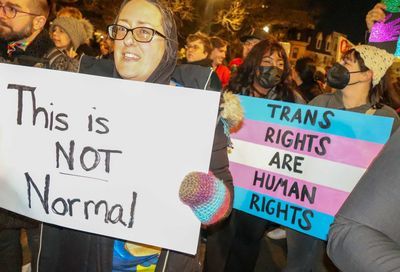California’s Huntington Beach Bans Pride Flags
Voters in Huntington Beach, California, approved an ordinance banning the LGBTQ Pride flag from flying on city property.

Voters in Huntington Beach, California, a Los Angeles exurb in Orange County, approved a measure last week to ban the Pride flag and any other non-governmental banners on city property. The move is part of a larger right-wing push against LGBTQ visibility.
While only 31% of registered voters showed up at the polls in this year’s presidential primary, the primary ballot also featured Measure B, which sought to limit the types of flags displayed on government property. Nearly 58% of those voters endorsed the measure, according to county election results.
Moving forward, any flag representing a political or social cause, such as breast cancer awareness, a specific religion, or a specific community — such as the LGBTQ community — will not be permitted to fly on city-owned flagpoles.
There are exemptions for city, county, and state flags, the U.S. and armed forces flags, and “commemorative banners,” such as flags for service members who are prisoners of war or missing in action, or banners for the Olympics.
The measure went to ballot after the City Council, fueled by the electoral victories of four conservative members, approved an ordinance to limit what types of flags could be displayed.
Previously, in 2021, a more liberal-leaning city council voted unanimously to fly the rainbow-colored Pride flag in June to commemorate Pride Month.
Councilmember Pat Burns, a Republican, led the effort to approve the ordinance.
Although Burns did not specifically mention the Pride flag when proposing the policy, he argued that the city “should avoid actions that could easily or mistakenly be perceived as divisive,” claiming that “all are equally valued members of our community, and none are to be treated differently or discriminated against.”
Notably, all other flags that had previously been flown on city property — with the exception of the Pride flag — were exempt in Burns’s approved ban.
To fly any other flags from city property in the future would require an additional exemption, granted only by a unanimous vote of the city council.
The approval of Measure B follows a trend of conservative-leaning cities and towns taking steps to defy the larger liberal society and left-leaning politicians, including Gov. Gavin Newsom, Attorney General Rob Bonta, and members of the Democratic-controlled legislature in Sacramento.
Last month, the Orange County Board of Supervisors approved similar legislation banning the Pride flag from being flown outside city property.
Some conservative-leaning school districts have sought to ban LGBTQ content from state-approved social studies and history curricula, or have adopted policies that force teachers to “out” transgender students to their parents.
Mayor Gracey Van Der Mark, a member of the city council’s conservative bloc who switched her party affiliation from Democrat to Republican in 2016, said the flag ordinance marks a return to the city’s conservative roots and a symbolic pushback against liberalism’s excesses.
“A lot of this is taking Huntington Beach back to how it was,” she said. “A lot of cities are afraid to push back because they don’t want to be the target of Sacramento. We’re not afraid.”
As reported by NBC News, Huntington Beach has become infamous for its conservative politics, with city council members passing bans on mask and vaccine mandates and establishing a panel to review children’s library books for alleged “sexual content,” including LGBTQ themes.
Members of the council’s liberal bloc argued that the conservatives’ actions are divisive.
Council member Dan Kalmick even suggested that the ordinance could scare away tourism — which is important to the city’s economic well-being — if LGBTQ or liberal-leaning people choose to travel or spend their money elsewhere.
“As a tourist community, I want to shake every tourist upside down by their ankles to get money out of them,” he said. “Therefore, we should be open and inclusive of everyone, and everyone should feel comfortable to come here and spend their money.”
Support Metro Weekly’s Journalism
These are challenging times for news organizations. And yet it’s crucial we stay active and provide vital resources and information to both our local readers and the world. So won’t you please take a moment and consider supporting Metro Weekly with a membership? For as little as $5 a month, you can help ensure Metro Weekly magazine and MetroWeekly.com remain free, viable resources as we provide the best, most diverse, culturally-resonant LGBTQ coverage in both the D.C. region and around the world. Memberships come with exclusive perks and discounts, your own personal digital delivery of each week’s magazine (and an archive), access to our Member's Lounge when it launches this fall, and exclusive members-only items like Metro Weekly Membership Mugs and Tote Bags! Check out all our membership levels here and please join us today!



























You must be logged in to post a comment.